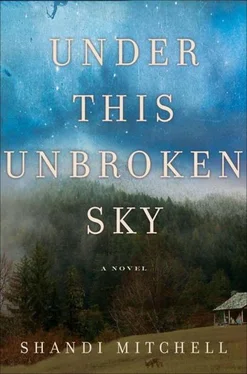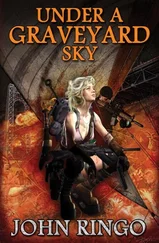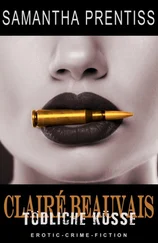Sometimes they sit outside together when the women need privacy. He nods his head knowingly when his father says, “This life ain’t fit for an animal.” And he leans back and crosses his legs like his father.
Lately Stefan has taken to long walks to the town road and back. Petro covertly follows him, hiding behind the house, then darting through the bush, keeping low across the clearing, then spying from the last stand of spruce, just before the road sprawls into the prairies.
Stefan always does the same thing. He steps onto the road and stands there like he’s waiting for someone to come along. He stomps his feet and blows on his hands to keep warm. He looks toward town like he can see something in the distance. Most days, nothing comes. He walks a few steps, then stops. His shoulders stoop, he shakes his head and curses. He spits twice on the road and turns back home. He looks older and tired on the walk back.
Sometimes, though, the police drive through and Stefan waves them down. They slow to a stop and roll down the window. His father acts like it’s a casual meeting of old friends, like he just happened to be walking by as they were driving through. He laughs and calls them by name, asks about their families and the news in town, gripes about the god-awful weather. Begs a cigarette. The officers don’t laugh or engage in Stefan’s small talk. They nod, playing the game, until one of the officers gets tired of playing and gruffly asks, “What’s new?”
Stefan leans into the window and lowers his voice. The talk is serious. Petro catches the names of neighbors, his uncle, people he doesn’t know. Talk about timber, squirrels, stolen property, and stills. It reminds Petro of a confession. The officers looking straight ahead, Stefan’s head bowed toward them. When he finishes, there is a moment of silence, then the officer slips Stefan a quarter. His father stands up straight, once again the gentleman. He demurely pockets the coin, glad that he could be of assistance. He slaps the car as it pulls away, like he’s sending it on its way. He waves, but they never wave back. Once they are far enough away, Stefan deflates. His shoulders drop, his head hangs. He spits twice, kicks the snow, and turns back home.
After these walks, it is always a bad day. Tato rails at Mama about her thieving brother and how much money that land is worth. He tosses the contents of Maria’s care packages around the room as evidence of them being treated like charity cases. Turnips from their garden, a rabbit-fur baby blanket poached from their land, salt beef bought from their seed.
He demands that Mama write letters to the land office and report that squatters are on their property. He composes the letters himself: offering proof about how much work he’s done on the land, clearing the fields, erecting buildings, cultivating and sowing, he cites all the legal facts of the case, that the land is in his wife’s name, and that they just need to check the homestead entry records. He tells them that Teodor is a convicted criminal and by their law he has no right to own land. He asks with all due respect that the trespassers be evicted.
Initially, Petro was confused by his father’s stories about doing all the work. Petro couldn’t remember him there. He remembered Teodor being dragged through the mud behind the plow, sitting in the cart’s shade eating cold pyrohy, the mosquitoes, and the Indian arrowhead. He remembered the fire, the smoke, the smell of burning grain and singed hair, his uncle standing up against a wall of flames. He remembered stooking the wheat with his cousins, sun-burned shoulders, and dust in his eyes and up his nose. He remembered his uncle felling trees and the horse dragging logs to the top of the hill. He remembered them moving and Teodor bringing him back to his own house. He remembered holding his hand and not wanting to let go.
But after a while, he made himself remember that his father was there too. And soon his father was doing all the things that Teodor had done. He practiced these memories until Teodor disappeared and only his father remained. Occasionally, Stefan would appear wearing Teodor’s clothes or speaking in that calm, low voice his uncle used when he spoke to horses and children. When that happened, Petro knew the memories were lies and wiped them away.
At first Mama wouldn’t sign the letters, no matter how loud his tato yelled. She covered her ears. She burrowed under the covers. She chanted, I can’t, I can’t, I can’t . Tato stroked her hair, gave her a drink of water, spoke softly in her ear, put the pen in her hand. Sign it.
Finally, he walked away from her. Didn’t say another word. He gathered up his clothes, his comb, his tin cup, his flask, and stuffed them in a burlap bag.
“Where are you going?” she asked, her voice trembling.
He put on his hat and coat and walked out the door. Petro clung to his legs, and when his father flung him aside, he got right back up and grabbed his sleeve. He promised to be better, he promised never to cry ever again, though he couldn’t stop then. He pleaded, Don’t go , and then he begged, Take me with you . He promised to work hard and make lots of money. His father hollered at him to get back in the house. Lesya pulled him inside. He kicked at his mother as she rushed out the door after Stefan. He screamed, This is your fault! Lesya slapped his face.
He watched his mother chase after his father. Her bulbous body floundered through the snow. Her cape spread out behind her like crow’s wings. He made her chase him almost to the road. She wrapped herself around his ankles. He stood like a king. He helped her back up to her feet. Petro could see her head nodding. His father put his arm around his mother and brought her back home.
She signed the letters. Stefan kissed her on the forehead and told her that soon he’d get her that big white house. He’d cut wild roses for her every day. He’d run her a hot bath in the cast-iron tub and the water would never get cold. She’d sleep in a brass bed and at night they’d turn on the electric lights and stay up way past dark. Soon they wouldn’t have to remember any of this.
Petro slides the stone heart over his own heart. He breathes in deep, watching it rise and fall. Now he remembers where he found the stone. It fell out of his chest the day he was born.
LESYA NAILS A BLANKET TO THE INSIDE WALLS OF THE chicken coop. She stuffs the cavity with straw and chinks the holes with cow manure. The gray wool diffuses the light, casting a warm glow. The hens cluck appreciatively.
She fluffs the straw covering the floor, shaping it into a knee-high mound. She steps into the middle, compacting it with her feet. She sits, draping her skirt around her. She pulls the straw close. Kneading it into place. She curls up in its roundness. Makes herself small.
DEPARTMENT OF LANDS AND MINES
November 3, 1938
Dear Sir
I was farming in the Northern district until 1935. In 1936, I went broke, had to vacate the land, but had no other place to move to and therefore had to go on a homestead. My sister advised me to file a homestead in her name, with the understanding that she would abandon the same in my favor when the necessary improvements to earn patent had been done by me. Having no other choice but to do so, I secured a quarter-section in my sister’s name and have settled there with my family.
After I broke 6 acres on the said land, erected a house, barn, granary and fencing, my sister’s husband, as well as my sister, are asking me to vacate this quarter-section. Please advise me whether or not my sister is in the right to take this land from me that I have paid my own entry fee. There was a paper signed and my son can say what it said.
Yours truly Teodor Mykolayenko November 7, 1938
Madam
Читать дальше












